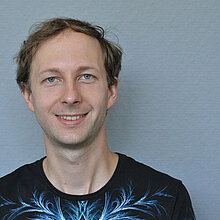Search
Displaying results 568 to 576 of 732.

Prof Dr Thomas Pietschmann
Research Group Leader
Experimental Virology
TWINCORE

Prof Dr Thomas Pietschmann
Deputy Scientific Director

Prof Dr Dr Luka Cicin-Sain
Head of Research Group
Viral Immunology
HZI Campus

Coming Soon

Prof Dr Chase Beisel
Research Group Leader
RNA Synthetic Biology
HIRI

Jun Prof Dr Alexey Gurevich
Head of Research Group
Human-Microbe Systems Bioinformatics
HIPS

Prof Dr Rolf Müller
Managing Director
HIPS

Prof Dr Kathrin de la Rosa
Research Group Leader
Personalised Immunotherapy
CiiM

Prof Dr Olga Kalinina
Head of Research Group
Drug Bioinformatics
HIPS